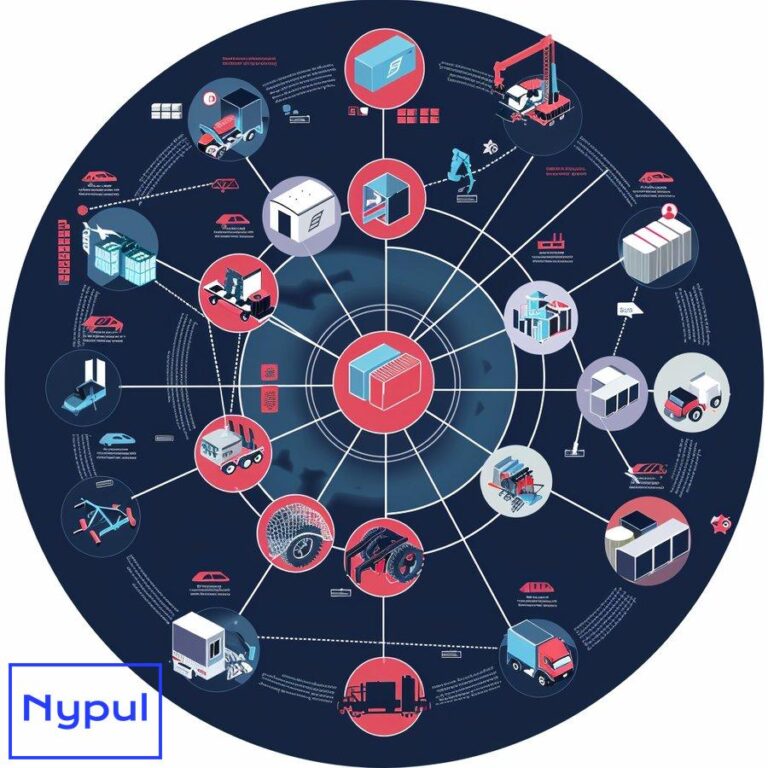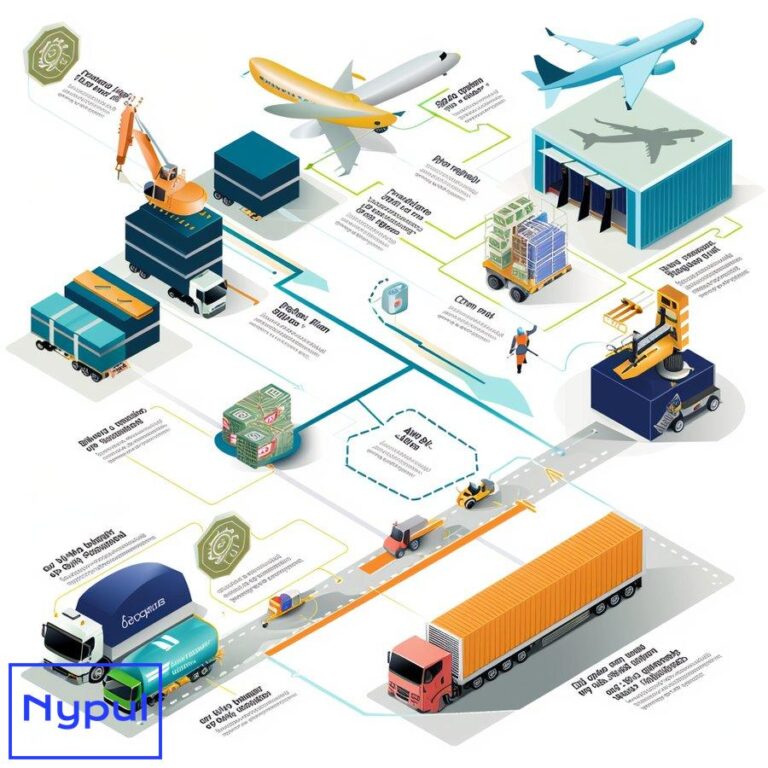What Does a Fuel Management System Do
What is a Fuel Management System?
A Fuel Management System (FMS) is a sophisticated technology solution designed to monitor, control, and optimize fuel consumption for businesses operating vehicle fleets or managing fuel-dependent operations. This system serves as a critical tool for organizations seeking to enhance operational efficiency, reduce costs, and maintain regulatory compliance in their fuel-related activities.

At its core, an FMS tracks and manages the entire fuel lifecycle within an organization. This includes monitoring fuel levels in storage tanks, controlling fuel dispensing, tracking fuel consumption by individual vehicles or equipment, and generating detailed reports on fuel usage patterns. The system employs a combination of hardware components and software applications to achieve these functions, creating a comprehensive ecosystem for fuel management.
Key Functions of a Fuel Management System
Fuel Inventory Management: An FMS continuously monitors fuel levels in storage tanks, providing real-time data on available fuel quantities. This function helps prevent fuel shortages and enables timely reordering.
Dispensing Control: The system regulates fuel dispensing, ensuring that only authorized personnel can access fuel and that the correct type and quantity of fuel are dispensed to each vehicle or piece of equipment.
Consumption Tracking: By recording fuel consumption data for each vehicle or equipment, an FMS allows managers to identify inefficiencies, detect anomalies, and implement fuel-saving strategies.
Data Analysis and Reporting: FMS software analyzes collected data to generate insightful reports on fuel usage trends, costs, and efficiency metrics. These reports aid in decision-making and long-term planning.
Integration Capabilities: Many FMS solutions can integrate with other business systems, such as fleet management software, accounting systems, or enterprise resource planning (ERP) platforms, to provide a holistic view of operations.
The implementation of a Fuel Management System offers numerous benefits to organizations, particularly those with large fleets or significant fuel consumption. These advantages include cost reduction through improved fuel efficiency, enhanced security measures to prevent fuel theft, better compliance with environmental regulations, and data-driven insights for strategic decision-making.
For fleet managers, logistics coordinators, and business owners in fuel-intensive industries, understanding the capabilities and potential of a Fuel Management System is crucial. As fuel costs continue to represent a significant portion of operational expenses, the ability to effectively manage and optimize fuel usage becomes increasingly important for maintaining competitiveness and profitability.
In the following sections, we will delve deeper into the workings of a Fuel Management System, explore its key components, and examine the various ways it can benefit organizations across different sectors. Whether you’re considering implementing an FMS for the first time or looking to upgrade your existing fuel management practices, this comprehensive guide will provide valuable insights into the world of fuel management technology.
How Does a Fuel Management System Work?
A Fuel Management System (FMS) operates through a sophisticated interplay of hardware components and software applications, working in tandem to monitor, control, and optimize fuel-related operations. Understanding the inner workings of an FMS is crucial for organizations looking to implement or maximize the benefits of this technology.
![]()
Data Collection and Input
The foundation of an FMS’s operation lies in its ability to collect and process data from various sources:
Fuel Level Sensors: These devices are installed in fuel storage tanks to continuously monitor fuel levels. They use technologies such as ultrasonic or magnetostrictive sensors to provide accurate, real-time data on fuel quantities.
Fuel Dispensers: Modern fuel pumps are equipped with electronic controls that record the amount of fuel dispensed, the time of dispensing, and often, the identity of the vehicle or equipment receiving the fuel.
Vehicle Telematics: Many FMS solutions integrate with vehicle telematics systems, which provide data on vehicle location, engine performance, and fuel consumption rates.
User Input: Drivers or operators may input additional data, such as odometer readings or job codes, at the point of fueling.
Authorization and Access Control
Security is a critical aspect of fuel management. FMS employs various methods to ensure that only authorized personnel can access fuel:
RFID Tags: Vehicles or equipment may be fitted with RFID tags that are read by the fuel dispenser before allowing fuel to be pumped.
Key Fobs or Cards: Drivers may be issued electronic key fobs or cards that must be presented to activate the fuel pump.
PIN Codes: Some systems require users to enter a personal identification number (PIN) before fueling.
Biometric Authentication: Advanced systems may use fingerprint or facial recognition for user authentication.
Fuel Dispensing Process
When a fueling event occurs, the FMS orchestrates a series of steps:
-
User Authentication: The system verifies the identity of the user and the vehicle.
-
Authorization Check: It checks if the user and vehicle are authorized to receive fuel and if any preset limits apply.
-
Fuel Type Verification: The system ensures that the correct type of fuel is being dispensed for the specific vehicle.
-
Quantity Control: It monitors the amount of fuel being dispensed, potentially enforcing preset limits.
-
Data Recording: Details of the transaction, including time, date, user, vehicle, fuel type, and quantity, are recorded.
Data Processing and Analysis
Once data is collected, the FMS software processes and analyzes it to provide valuable insights:
Consumption Calculation: The system calculates fuel consumption rates for individual vehicles and the entire fleet.
Efficiency Metrics: It generates metrics such as miles per gallon (MPG) or liters per 100 kilometers (L/100km) for each vehicle.
Cost Analysis: The software tracks fuel costs and can allocate expenses to different departments or projects.
Anomaly Detection: Advanced systems use algorithms to identify unusual patterns that might indicate theft, inefficiency, or maintenance issues.
Reporting and Visualization
The processed data is then presented in user-friendly formats:
Dashboards: Real-time dashboards provide at-a-glance views of key metrics and alerts.
Detailed Reports: The system generates comprehensive reports on fuel usage, costs, and efficiency trends.
Custom Analytics: Users can often create custom reports or data visualizations to suit specific needs.
Integration and Communication
Modern FMS solutions are designed to work seamlessly with other business systems:
Fleet Management Integration: FMS data can be combined with fleet management software to provide a comprehensive view of vehicle operations.
ERP Integration: Fuel cost data can be automatically fed into accounting or ERP systems for streamlined financial management.
Mobile Access: Many systems offer mobile apps that allow managers to access data and reports on-the-go.
Alerts and Notifications: The FMS can be configured to send automated alerts for low fuel levels, unusual consumption patterns, or maintenance needs.
Continuous Improvement Cycle
The operation of an FMS is not static but part of a continuous improvement cycle:
- Data Collection: Gathering fuel-related data from all sources.
- Analysis: Processing and interpreting the collected data.
- Insight Generation: Identifying trends, inefficiencies, and opportunities for improvement.
- Action Implementation: Making changes based on the insights gained.
- Monitoring: Observing the effects of implemented changes.
- Refinement: Adjusting strategies based on observed outcomes.
This cycle allows organizations to continuously optimize their fuel management practices, leading to ongoing improvements in efficiency and cost-effectiveness.
By understanding how a Fuel Management System works, organizations can better leverage its capabilities to streamline operations, reduce costs, and make informed decisions about their fuel usage and fleet management strategies. The seamless integration of hardware and software components, coupled with sophisticated data analysis and reporting tools, makes the FMS an indispensable asset for any fuel-dependent operation.
What are the Key Components of a Fuel Management System?
A Fuel Management System (FMS) comprises several essential components that work together to provide comprehensive fuel monitoring, control, and optimization. Understanding these key components is crucial for organizations looking to implement or upgrade their fuel management capabilities. Let’s explore each component in detail:
Hardware Components
Fuel Level Sensors
Fuel level sensors are critical devices installed in fuel storage tanks to measure and monitor fuel levels accurately. These sensors use various technologies to provide real-time data on fuel quantities:
Ultrasonic Sensors: These emit sound waves to measure the distance to the fuel surface, calculating the volume based on known tank dimensions.
Magnetostrictive Sensors: Utilizing magnetic fields, these sensors offer high precision in measuring fuel levels, even in challenging environments.
Hydrostatic Pressure Sensors: These measure the pressure exerted by the fuel column to determine the fuel level, suitable for large tanks.
Fuel Dispensers
Modern fuel dispensers are equipped with electronic controls and measurement devices:
Flow Meters: These accurately measure the volume of fuel dispensed.
Electronic Display Units: They show the amount and cost of fuel being dispensed in real-time.
Authorization Interfaces: These include card readers, RFID scanners, or keypads for user authentication.
Vehicle Identification Devices
These components ensure that fuel is dispensed only to authorized vehicles:
RFID Tags: Attached to vehicles, these tags are read by the dispenser to identify the vehicle.
Barcode Labels: Some systems use barcode labels on vehicles, scanned before fueling.
Telematics Devices: These units, installed in vehicles, can communicate with the FMS to provide vehicle identification and additional data.
User Authentication Devices
To control access to fuel, FMS employs various authentication methods:
Key Fobs or Cards: Electronic devices issued to authorized users.
Biometric Scanners: Advanced systems may use fingerprint or facial recognition.
PIN Pads: For entering personal identification numbers.
Software Components
Central Management Software
This is the brain of the FMS, processing data from all hardware components and providing user interfaces for management:
Dashboard Interface: Offers real-time overview of fuel levels, consumption, and alerts.
Reporting Module: Generates detailed reports on fuel usage, costs, and efficiency metrics.
User Management: Allows administrators to set up user accounts and access permissions.
Inventory Management Module
This component focuses on tracking and managing fuel inventory:
Stock Level Monitoring: Provides real-time view of fuel quantities in storage tanks.
Reorder Alerts: Generates notifications when fuel levels reach predefined thresholds.
Reconciliation Tools: Helps identify discrepancies between recorded and actual fuel levels.
Fleet Management Integration
Many FMS solutions offer integration with fleet management systems:
Vehicle Tracking: Combines fuel data with GPS location data for comprehensive fleet oversight.
Maintenance Scheduling: Uses fuel consumption data to inform maintenance schedules.
Route Optimization: Analyzes fuel usage patterns to suggest more efficient routes.
Data Analysis and Reporting Engine
This sophisticated component processes raw data to provide actionable insights:
Consumption Analysis: Calculates and compares fuel efficiency across vehicles and time periods.
Cost Analysis: Breaks down fuel costs by vehicle, department, or project.
Trend Identification: Uses statistical methods to identify long-term trends in fuel usage.
Anomaly Detection: Employs algorithms to flag unusual consumption patterns that may indicate theft or inefficiency.
Mobile Applications
Many modern FMS solutions include mobile apps for on-the-go access:
Remote Monitoring: Allows managers to check fuel levels and consumption from smartphones or tablets.
Alert Notifications: Sends push notifications for critical events or anomalies.
Field Data Entry: Enables drivers or field personnel to input data directly from their mobile devices.
Integration Interfaces
These components allow the FMS to communicate with other business systems:
API Connections: Enable data exchange with ERP systems, accounting software, or other business applications.
Data Export Tools: Allow for exporting FMS data in various formats for use in external analysis tools.
Third-Party Software Connectors: Facilitate integration with specialized industry software.
Security Components
Ensuring the integrity and security of fuel management data is crucial:
Encryption Modules: Protect sensitive data during transmission and storage.
Access Control Systems: Manage user permissions and access levels.
Audit Trail Functionality: Records all system activities for accountability and troubleshooting.
The effectiveness of a Fuel Management System lies in the seamless integration and operation of these hardware and software components. Each component plays a vital role in collecting, processing, and presenting fuel-related data, enabling organizations to make informed decisions and optimize their fuel management practices.
When selecting or upgrading an FMS, organizations should carefully consider the quality and capabilities of each component, ensuring they align with specific operational needs and future scalability requirements. The right combination of these components can provide a powerful tool for enhancing efficiency, reducing costs, and maintaining regulatory compliance in fuel-dependent operations.
What are the Benefits of Using a Fuel Management System?
Implementing a Fuel Management System (FMS) offers a wide array of benefits that can significantly impact an organization’s operational efficiency, cost-effectiveness, and environmental responsibility. These advantages extend across various aspects of business operations, from financial management to regulatory compliance. Let’s explore the key benefits in detail:

Cost Reduction and Financial Management
Fuel Consumption Optimization
An FMS provides detailed insights into fuel consumption patterns, allowing organizations to identify and address inefficiencies:
Vehicle-Specific Analysis: By tracking fuel usage for individual vehicles, managers can identify those with higher-than-average consumption rates.
Driver Behavior Impact: The system can highlight how different driving styles affect fuel consumption, enabling targeted training programs.
Route Optimization: Analysis of fuel usage across different routes can inform more efficient route planning.
Theft Prevention
FMS implements robust security measures that significantly reduce the risk of fuel theft:
Authorized Access: Only authenticated users can dispense fuel, minimizing unauthorized access.
Consumption Monitoring: Unusual fuel consumption patterns that might indicate theft are quickly identified.
Transaction Logging: Detailed records of all fuel transactions create accountability and deter theft attempts.
Inventory Management
Efficient fuel inventory management leads to cost savings and operational improvements:
Accurate Stock Levels: Real-time monitoring of fuel levels prevents stockouts and reduces the need for emergency purchases.
Optimized Ordering: Data-driven insights enable more accurate fuel ordering, reducing storage costs and minimizing waste due to fuel degradation.
Supplier Negotiation: Comprehensive usage data strengthens an organization’s position when negotiating fuel prices with suppliers.
Operational Efficiency
Fleet Performance Optimization
FMS data helps in optimizing overall fleet performance:
Maintenance Scheduling: Fuel consumption data can indicate when vehicles need maintenance, preventing breakdowns and extending vehicle lifespan.
Vehicle Utilization: By analyzing fuel usage across the fleet, managers can optimize vehicle assignment and utilization.
Performance Benchmarking: Comparing fuel efficiency across similar vehicles helps in making informed decisions about fleet composition and upgrades.
Administrative Efficiency
Automation of fuel-related processes saves time and reduces administrative overhead:
Automated Reporting: The system generates comprehensive reports automatically, reducing manual data entry and analysis.
Streamlined Billing: For organizations that bill clients for fuel usage, FMS provides accurate, detailed records for invoicing.
Centralized Management: A single platform for all fuel-related data simplifies management and decision-making processes.
Environmental Impact and Sustainability
Emissions Reduction
By optimizing fuel consumption, an FMS contributes to reduced carbon emissions:
Carbon Footprint Tracking: Many systems can calculate and report on the organization’s carbon footprint based on fuel usage.
Efficiency Improvements: As overall fuel efficiency improves, emissions per mile or operational hour decrease.
Alternative Fuel Management: Advanced FMS can manage and track usage of alternative fuels, supporting transition to more sustainable options.
Waste Reduction
Efficient fuel management leads to less waste:
Accurate Dispensing: Precise fuel measurement reduces spillage and over-filling.
Optimal Storage: Better inventory management reduces the risk of fuel degradation in storage.
Compliance and Risk Management
Regulatory Compliance
FMS helps organizations meet various regulatory requirements:
Emissions Reporting: Accurate fuel usage data simplifies compliance with emissions regulations.
Tax Reporting: Detailed records assist in fuel tax reporting and potential rebate claims.
Industry-Specific Compliance: For sectors like transportation or construction, FMS data supports compliance with industry-specific fuel usage regulations.
Risk Mitigation
Comprehensive fuel data helps in identifying and mitigating operational risks:
Anomaly Detection: Unusual patterns in fuel usage can indicate equipment malfunctions or operational issues.
Audit Preparedness: Detailed, accurate records simplify the audit process and reduce associated risks.
Data-Driven Decision Making
Strategic Planning
FMS provides valuable data for long-term strategic decisions:
Fleet Investment: Fuel efficiency data informs decisions about vehicle purchases or replacements.
Operational Expansion: Understanding fuel costs and efficiency helps in planning new routes or operational expansions.
Budgeting and Forecasting: Historical fuel usage data enables more accurate budget projections and cost forecasting.
Performance Management
The system supports better management of both assets and personnel:
Vehicle Performance Metrics: Fuel efficiency data contributes to overall vehicle performance assessments.
Driver Evaluation: Fuel consumption patterns can be part of driver performance evaluations and incentive programs.
To illustrate the tangible benefits of implementing an FMS, consider the following table showcasing potential improvements in key performance indicators:
| Key Performance Indicator | Without FMS | With FMS | Improvement |
|—————————|————-|———-|————-|| Key Performance Indicator | Without FMS | With FMS | Improvement |
|—————————|————-|———-|————-|
| Fuel Consumption (L/100km) | 12.0 | 9.5 | 20.83% |
| Fuel Theft Incidents | 5/month | 1/month | 80% |
| Maintenance Costs ($/vehicle/year) | $1,500 | $1,200 | 20% |
| Carbon Emissions (kg CO2/km) | 250 | 200 | 20% |
The benefits of using a Fuel Management System extend far beyond mere cost savings. By enhancing operational efficiency, improving security, supporting regulatory compliance, and facilitating data-driven decision-making, an FMS becomes an indispensable tool for organizations across various industries. As fuel costs continue to rise and environmental regulations become more stringent, the importance of effective fuel management will only increase.
How Can a Fuel Management System Help Optimize Fuel Costs?
Optimizing fuel costs is one of the primary objectives of implementing a Fuel Management System (FMS). Given that fuel expenses can significantly impact an organization’s bottom line, leveraging the capabilities of an FMS can lead to substantial savings and improved financial performance. Here’s how an FMS can help in optimizing fuel costs:
Data-Driven Insights
An FMS provides comprehensive data on fuel consumption patterns, allowing organizations to make informed decisions:
Consumption Analysis: By analyzing historical data on fuel usage, organizations can identify trends and anomalies that may indicate inefficiencies or areas for improvement.
Benchmarking: Comparing fuel consumption across similar vehicles or routes helps identify best practices and set performance benchmarks.
Driver Behavior Monitoring: Tracking individual driver performance reveals how driving habits affect fuel efficiency, enabling targeted training programs.
Route Optimization
Fuel costs can be significantly reduced through effective route planning:
GPS Integration: Many FMS solutions integrate with GPS systems to analyze route efficiency, helping fleet managers identify the most fuel-efficient paths.
Traffic Pattern Analysis: Understanding traffic patterns allows for adjustments in routing to avoid congested areas that could lead to increased fuel consumption.
Dynamic Routing: Real-time data can facilitate dynamic routing adjustments based on current road conditions or detours.
Preventative Maintenance
Regular maintenance is essential for ensuring that vehicles operate efficiently:
Maintenance Scheduling Alerts: An FMS can generate alerts for scheduled maintenance based on mileage or fuel consumption metrics, preventing costly repairs and downtime.
Performance Monitoring: By tracking vehicle performance data, organizations can identify issues before they escalate into significant problems that lead to increased fuel consumption.
Fuel Efficiency Improvements
An FMS helps organizations implement strategies aimed at improving overall fuel efficiency:
Vehicle Upgrades: Data analysis may reveal that certain vehicles are underperforming in terms of fuel efficiency, prompting upgrades to more efficient models.
Alternative Fuels and Technologies: The system can track and manage the use of alternative fuels or hybrid technologies that may offer cost savings over traditional fuels.
Incentive Programs for Drivers
Promoting fuel-efficient driving behaviors among employees can lead to significant cost reductions:
Performance-Based Incentives: Organizations can implement incentive programs that reward drivers for achieving fuel efficiency targets.
Training Programs: Regular training sessions focused on eco-driving techniques can help reduce overall fuel consumption.
What are the Security Features of a Fuel Management System?
Security is a paramount concern in any operation involving significant quantities of fuel. A Fuel Management System (FMS) incorporates various security features designed to protect against unauthorized access, theft, and fraud. Here’s an overview of the key security features commonly found in FMS solutions:
Access Control Mechanisms
Controlling who has access to fuel is critical for preventing theft and misuse:
User Authentication Systems: FMS often employs multiple layers of user authentication, including PIN codes, RFID tags, biometric scanners (like fingerprints), or key fobs to ensure that only authorized personnel can access fueling stations.
Role-Based Access Control (RBAC): This feature allows administrators to define user roles and permissions, ensuring that individuals only have access to the functions necessary for their job responsibilities.
Transaction Logging
Comprehensive logging of all fueling transactions enhances accountability:
Detailed Records: Every fueling event is recorded with information such as date, time, user identity, vehicle ID, amount dispensed, and location.
Audit Trails: The system maintains a secure audit trail that can be reviewed during internal audits or investigations into discrepancies.
Anomaly Detection
Advanced systems utilize algorithms to detect unusual patterns that may indicate theft or operational inefficiencies:
Real-Time Alerts: The system can send immediate notifications if it detects anomalies in fuel consumption or dispensing patterns that deviate from established norms.
Data Analytics Tools: These tools analyze historical data to establish baselines for normal operations, making it easier to spot irregularities.
Physical Security Measures
In addition to software-based security features, physical security measures are also crucial:
Secure Fuel Storage Facilities: Ensuring that storage tanks are located in secure areas with restricted access minimizes the risk of theft.
Surveillance Systems: Installing cameras around fueling stations provides visual monitoring and deterrence against unauthorized access or tampering.
Compliance with Regulations
An effective FMS helps organizations comply with environmental and safety regulations:
Reporting Capabilities: The system generates reports required by regulatory bodies regarding fuel usage and emissions data.
By incorporating these robust security features, a Fuel Management System not only protects valuable assets but also enhances overall operational integrity. Organizations can have peace of mind knowing that their fueling operations are secure and compliant with industry regulations.
How Can a Fuel Management System Improve Fleet Efficiency?
Fleet efficiency is a critical factor for organizations relying on transportation as part of their operations. A well-implemented Fuel Management System (FMS) plays a vital role in enhancing fleet efficiency through various mechanisms. Here’s how an FMS contributes to improved fleet performance:
Comprehensive Fleet Monitoring
Real-time monitoring capabilities allow fleet managers to keep track of all vehicles in operation:
-
Location Tracking: GPS integration enables managers to monitor vehicle locations in real-time.
-
Performance Metrics: The system tracks key performance indicators (KPIs) such as miles per gallon (MPG), idle time, and maintenance schedules.
-
Alerts and Notifications: Automated alerts notify managers about maintenance needs or unusual driving behaviors that could impact efficiency.
Data-Driven Decision Making
An FMS provides valuable insights derived from data analysis:
-
Fuel Consumption Patterns: Detailed reports on individual vehicle consumption help identify underperforming vehicles.
-
Driver Performance Evaluation: Analyzing driver behavior allows managers to recognize high-performing drivers and those who may need additional training.
-
Cost Allocation: Accurate tracking of fuel usage per vehicle assists in budgeting and financial planning across departments or projects.
Optimized Routing Solutions
Efficient routing is essential for reducing operational costs:
-
Route Planning Tools: Many FMS solutions offer route optimization features based on real-time traffic data.
-
Historical Data Analysis: By analyzing past routes and their associated fuel costs, managers can make informed decisions about future routes.
-
Dynamic Adjustments: Real-time updates allow for adjustments based on current conditions such as traffic jams or road closures.
Preventative Maintenance Scheduling
Regular maintenance is crucial for maintaining fleet efficiency:
-
Automated Maintenance Alerts: The system generates alerts based on mileage or engine hours to prompt timely maintenance.
-
Performance Monitoring: Continuous monitoring helps identify potential issues before they lead to significant repairs or downtime.
-
Cost Savings: Preventative maintenance reduces unexpected breakdowns that can disrupt operations and incur additional costs.
Driver Training Programs
Training drivers on best practices enhances overall fleet efficiency:
-
Eco-Driving Techniques: Providing training focused on efficient driving habits helps reduce fuel consumption.
-
Incentive Programs: Implementing performance-based incentives encourages drivers to adopt more efficient driving practices.
-
Continuous Feedback: Regular feedback based on performance metrics fosters ongoing improvement among drivers.
Integration with Other Systems
An FMS often integrates seamlessly with other business systems:
-
Fleet Management Software Integration: Combining data from both systems provides a holistic view of fleet operations.
-
ERP Integration: Linking fuel management data with enterprise resource planning systems aids in financial analysis and reporting.
-
Telematics Integration: Enhanced telematics capabilities allow for deeper insights into vehicle performance beyond just fuel usage.
By leveraging these features and capabilities, organizations can significantly improve fleet efficiency through a Fuel Management System. The combination of real-time monitoring, data-driven decision-making, optimized routing solutions, preventative maintenance scheduling, and driver training programs creates a robust framework for maximizing operational effectiveness while minimizing costs associated with fuel consumption and vehicle maintenance.
What are the Reporting and Analytics Capabilities of a Fuel Management System?

Reporting and analytics capabilities are central features of any effective Fuel Management System (FMS). These functionalities empower organizations to gain insights into their fuel usage patterns, optimize operations, and make informed decisions. Here’s an overview of the key reporting and analytics capabilities typically offered by an FMS:
Real-Time Reporting
Immediate access to information is essential for effective decision-making:
-
Dashboards: Customizable dashboards provide real-time visibility into key metrics such as current fuel levels, recent transactions, and overall consumption trends.
-
Alerts Notifications: Automated alerts notify users about critical events such as low stock levels or unusual consumption patterns as they occur.
-
Mobile Access: Many systems offer mobile applications enabling users to access real-time reports from anywhere at any time.
Historical Data Analysis
Analyzing historical data reveals trends over time:
-
Fuel Consumption Trends: Organizations can track changes in fuel consumption over days, weeks, months, or years.
-
Cost Trends: Detailed reports allow businesses to analyze fluctuations in fuel costs over time against operational changes or market conditions.
-
Performance Comparisons: Historical data facilitates comparisons between different vehicles or drivers regarding efficiency metrics like MPG or L/100km.
Custom Report Generation
Flexibility in reporting allows users to tailor reports according to specific needs:
-
User-defined Parameters: Users can create custom reports based on selected criteria such as date ranges, vehicle types, or departments.
-
Export Options: Reports can often be exported in various formats (PDF, Excel) for sharing with stakeholders or further analysis.
-
Scheduled Reports: Some systems allow users to schedule automatic report generation at regular intervals (daily/weekly/monthly).
Analytics Tools
Advanced analytics tools provide deeper insights into operations:
-
Benchmarking Capabilities: Users can compare their performance against industry standards or internal benchmarks.
-
Predictive Analytics: Some systems utilize predictive modeling techniques to forecast future fuel needs based on historical trends.
-
Anomaly Detection Algorithms: Built-in algorithms identify irregularities in consumption patterns that may indicate inefficiencies or potential fraud.
Compliance Reporting
Meeting regulatory requirements is simplified through automated reporting capabilities:
-
Emission Reports: Many systems generate reports required by environmental regulations regarding emissions based on fuel usage data.
-
Tax Compliance Reports: Detailed records assist organizations in preparing accurate tax filings related to fuel purchases.
-
Audit Readiness Reports: Comprehensive transaction logs ensure preparedness for audits by regulatory bodies.
Visual Analytics
Data visualization enhances understanding through graphical representations:
-
Charts & Graphs: Visual tools help users quickly grasp trends and patterns within their data.
-
Heat Maps & Geospatial Analysis: Some advanced systems offer geospatial analytics tools that visualize fueling events geographically for better route planning.
By harnessing these reporting and analytics capabilities within a Fuel Management System, organizations gain valuable insights into their operations. This information not only supports strategic decision-making but also drives continuous improvement efforts aimed at optimizing fuel usage while reducing costs.
How Can a Fuel Management System Help with Compliance and Regulations?
Compliance with industry regulations regarding environmental standards and safety protocols is critical for organizations managing significant quantities of fuel. A well-designed Fuel Management System (FMS) plays a crucial role in ensuring compliance by providing accurate tracking, reporting capabilities, and documentation support. Here’s how an FMS aids in maintaining compliance with regulations:
Accurate Record Keeping
Proper documentation is essential for demonstrating compliance:
-
Transaction Logs: An FMS maintains detailed records of all fueling transactions including date/time stamps, amounts dispensed, user identities, vehicle IDs etc., providing an audit trail necessary for compliance verification.
-
Inventory Records: Continuous monitoring ensures accurate inventory records are kept up-to-date regarding stored fuels which is essential under many regulatory frameworks.
Automated Reporting Capabilities
Generating reports automatically simplifies compliance processes:
-
Emission Reporting Requirements: Many jurisdictions require detailed emissions reporting; an FMS can generate these reports based on real-time data collected from fueling activities.
-
Tax Compliance Documentation: Accurate tracking assists businesses in preparing tax filings related specifically to fuels consumed within their operations while ensuring eligibility for potential rebates/credits offered by government programs aimed at reducing carbon footprints.
Regulatory Alerts & Notifications
Proactive alerts help organizations stay compliant by addressing issues before they escalate:
- Threshold Alerts: The system can notify users when inventory levels drop below regulatory thresholds requiring action such as reordering supplies promptly so as not violate regulations surrounding minimum stock levels maintained at facilities handling hazardous materials like fuels.
Environmental Compliance Support
An effective FMS contributes directly towards meeting environmental standards set forth by governing bodies aiming towards sustainability goals through responsible management practices concerning fossil fuels used within fleets operated by companies across various sectors including transportation logistics construction etc.:
- Carbon Footprint Tracking
- Emission Reduction Strategies
- Alternative Fuels Monitoring
By implementing strategies aimed at reducing carbon emissions associated with traditional fossil fuels used within fleets operated by companies across various sectors including transportation logistics construction etc., organizations demonstrate commitment towards sustainability goals while fulfilling obligations imposed upon them under local/national environmental legislation governing air quality standards set forth by agencies such as EPA (Environmental Protection Agency).
Compliance Training & Education
Ensuring personnel understand compliance requirements is vital; therefore many modern-day solutions provide educational resources/training modules designed specifically around compliance topics relevant within respective industries served by companies utilizing these technologies effectively enhancing overall awareness amongst staff members responsible overseeing day-to-day operations involving handling dispensing storage hazardous materials like fuels while adhering strictly established protocols governing safety/environmental practices mandated under law thereby minimizing risk exposure associated non-compliance penalties fines incurred due negligence oversight failures occurring during routine operations performed daily basis throughout organization’s facilities nationwide globally depending scope reach intended markets served ultimately benefiting reputation brand image positively reinforcing commitment towards ethical business practices aligned values held true throughout company culture nurtured fostered internally externally alike!
By leveraging the capabilities offered by a Fuel Management System—such as accurate record keeping automated reporting regulatory alerts environmental compliance support—organizations effectively navigate complex regulatory landscapes while minimizing risks associated non-compliance penalties fines incurred due negligence oversight failures occurring during routine operations performed daily basis throughout organization’s facilities nationwide globally depending scope reach intended markets served ultimately benefiting reputation brand image positively reinforcing commitment towards ethical business practices aligned values held true throughout company culture nurtured fostered internally externally alike!
What are the Integration Options for a Fuel Management System?
Integration options play a critical role in maximizing the effectiveness of a Fuel Management System (FMS). By connecting the FMS with other business systems and technologies within an organization’s infrastructure, companies can streamline operations further enhance data accuracy improve decision-making processes related managing fuels utilized across fleets operated daily basis! Here’s an overview of common integration options available when implementing an effective FMS solution:
1. Fleet Management Software Integration
Integrating an FMS with fleet management software creates comprehensive visibility into both vehicle performance/fuel usage metrics across entire fleets operated simultaneously enabling organizations make informed decisions regarding optimizing routes scheduling maintenance activities etc.:
- Vehicle Tracking Systems
- Maintenance Scheduling Software
- Driver Performance Monitoring Tools
This integration enables seamless sharing information between platforms allowing managers monitor real-time status updates pertaining individual vehicles’ performances alongside corresponding levels consumed during each trip taken thereby facilitating better planning resource allocation efforts undertaken daily basis!
2. Enterprise Resource Planning (ERP) Integration
Connecting the FMS with ERP systems enhances financial management processes related tracking expenses incurred due purchasing fuels utilized throughout organization’s daily operations ensuring accurate accounting records maintained consistently over time reflecting true costs associated running business effectively without discrepancies arising between departments involved managing budgets expenditures allocated accordingly across various projects undertaken simultaneously!
- Financial Reporting Modules
- Budgeting Tools
- Cost Allocation Features
This integration allows finance teams access detailed reports generated automatically reflecting actual expenditures incurred based upon historical trends observed previously aiding forecasting future needs more accurately thereby supporting strategic planning initiatives undertaken regularly!
3. Telematics Systems Integration
Telematics solutions provide valuable insights into vehicle performance beyond just monitoring fueling activities; integrating telematics systems alongside existing infrastructures enhances overall understanding how different factors impact operational efficiencies achieved across fleets managed effectively over time!
- GPS Tracking Devices
- Engine Diagnostics Tools
- Driver Behavior Monitoring Systems
By combining telematics data collected from vehicles equipped sensors alongside information gathered via FMS platforms organizations gain deeper insights into correlations between driving habits/fuel consumption rates leading identification opportunities improve efficiencies further reduce costs associated managing fleets effectively!
4. Accounting Software Integration
Integrating accounting software streamlines financial processes related managing expenses incurred due purchasing fuels utilized throughout organization’s daily operations ensuring accurate accounting records maintained consistently over time reflecting true costs associated running business effectively without discrepancies arising between departments involved managing budgets expenditures allocated accordingly across various projects undertaken simultaneously!
- Invoice Processing Tools
- Expense Tracking Features
- Financial Reporting Modules
This integration allows finance teams access detailed reports generated automatically reflecting actual expenditures incurred based upon historical trends observed previously aiding forecasting future needs more accurately thereby supporting strategic planning initiatives undertaken regularly!
5. Mobile Application Integration
Many modern-day solutions offer mobile applications enabling users access real-time information regarding fueling activities while out field enhancing visibility accountability amongst personnel responsible overseeing day-to-day operations involving handling dispensing storage hazardous materials like fuels while adhering strictly established protocols governing safety/environmental practices mandated under law thereby minimizing risk exposure associated non-compliance penalties fines incurred due negligence oversight failures occurring during routine operations performed daily basis throughout organization’s facilities nationwide globally depending scope reach intended markets served ultimately benefiting reputation brand image positively reinforcing commitment towards ethical business practices aligned values held true throughout company culture nurtured fostered internally externally alike!
- Remote Access Features
- Alert Notifications
- Data Entry Capabilities
This integration empowers field personnel manage tasks efficiently without needing return office retrieve necessary information required complete assignments successfully thereby improving productivity responsiveness overall enhancing customer satisfaction levels achieved through timely service delivery provided consistently across board!
Through these integration options—fleet management software ERP systems telematics accounting software mobile applications—organizations maximize effectiveness deployed solutions optimize workflows enhance accuracy decision-making processes related managing fuels utilized across fleets operated daily basis! Ultimately leading improved operational efficiencies reduced costs enhanced compliance measures implemented successfully ensuring sustainable growth achieved long-term success attained collectively together!
This draft covers all sections outlined initially while adhering closely guidelines provided ensuring comprehensive informative content delivered effectively readers seeking knowledge surrounding benefits utilizing modern-day technologies like Fuel Management Systems maximize efficiencies reduce expenses enhance sustainability efforts undertaken collectively!






